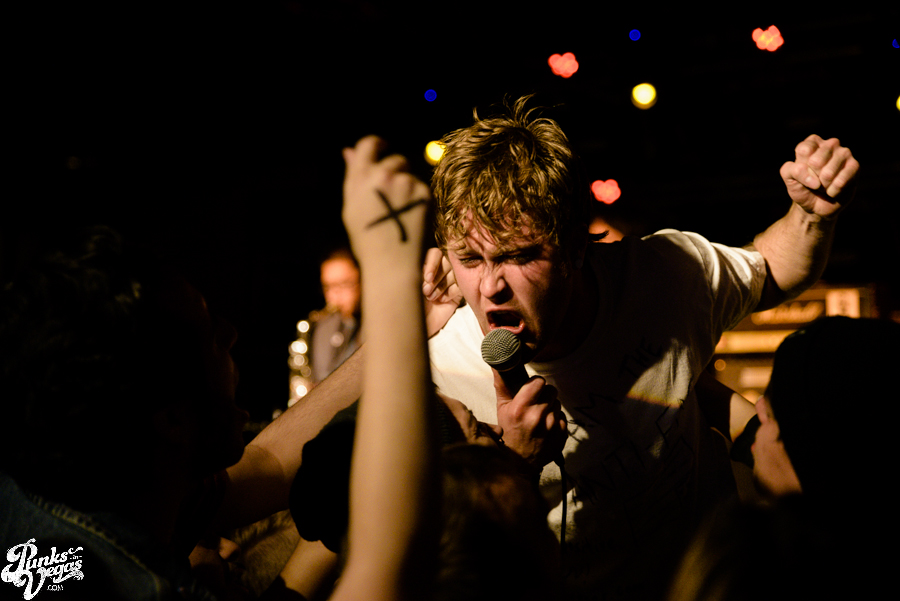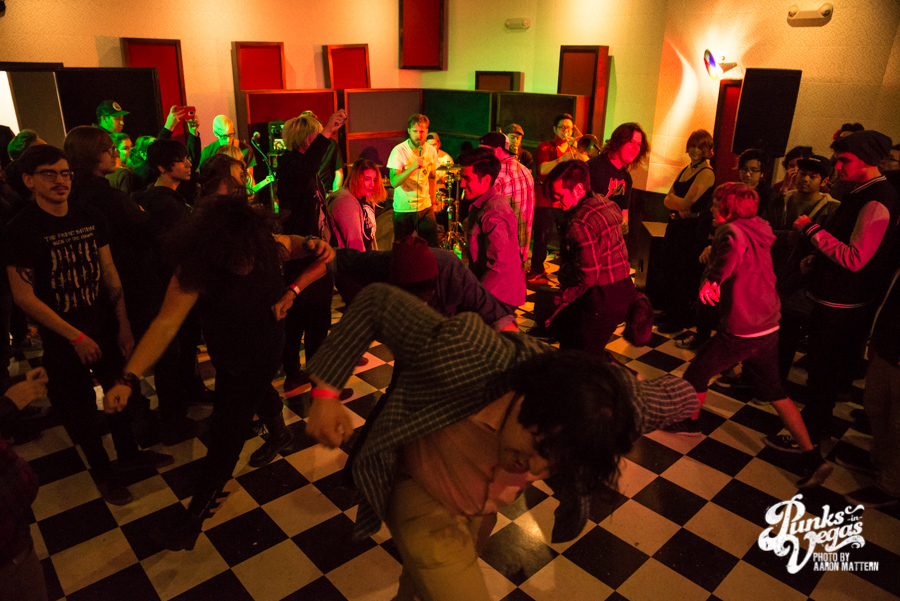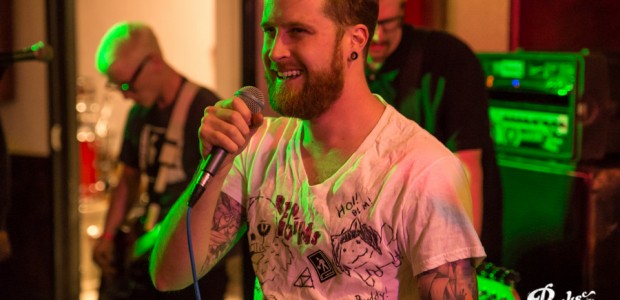Be Like Max is one of the hardest working bands in Vegas, playing countless local shows between independently recording and releasing three albums and relentlessly touring. Their hard work has paid off, with a dedicated fanbase and planned stints on this year’s Extreme Thing and Punk Rock Bowling festivals. With all that on their plate, BLM frontman Charley Fine still took the time to answer these eight questions.

Let’s talk musical background – I know you were in Everyone Meltdown before Be Like Max, but what other bands have you been in? How did your first band came together? Did you ever play an instrument or were you always focused on vocals?
Well, my first band (that actually played shows) was formed when I was 16 in the year 2005. We were a Ska/Punk band by the name of The Shifty Penguins who mainly played in backyards and our old stomping grounds The Rock n’ Java. I did sing and play sax at the time, but went on to focus more on saxophone and less on vocals (mainly because I was an awful singer).
Around 2007 I formed a Reggae/Rock band with some ex-GDB and ex-Frolicaholic members by the name of Huxtable. The Huxtable days are special to me because they gave me my first ever opportunities to open shows for my idols. We had many shows at places like University Theater and Jillian’s opening for bands like Mustard Plug, Buck O’ Nine, and The Debonaires.
About a year later I was to join up as the sax player for already established reggae/rock group One Pin Short. OPS days were some of the best times of my life. Within weeks of joining I quit my job, moved out of my apartment, and hit the road for my first tour ever (which happened to be 5 weeks coast to coast). We got to work with producer Eddie Ashworth, who worked with bands like Pennywise, Unwritten Law, and Sublime. We were even given the opportunity to open tours for bands like Reel Big Fish and Streetlight Manifesto. I have a RBF tattoo with a ticket stub dating Jan 1st, 2009 on it because touring with that band was my dream and I achieved it.
After the reality of what it took to be a struggling musician set in my fragile young mind, I quit and went back to school for a bit. During this time, in order to fill my need for playing music, I actually played drums in a Hardcore/Punk band by the name of Start. I’m a shitty drummer and this only lasted a few shows before I went back to my first love – Ska/Punk. I formed the band Everyone Meltdown soon to be called Be Like Max in the year 2010. It is now 2016, I’m still playing music, and BLM is still going strong.
Ska music is often maligned and is obviously not as mainstream as it was in the 90s. Why do you think that is? What do you like about the genre and what do you think it will take to get it back into the mainstream (or even bigger in the underground scene)?
Ska music is as old as the 1950s, and has had different forms performed by many unique artists. It’s hard for me to believe people legitimately dislike the entire genre. I think it’s often maligned because they once heard a band they didn’t like and forever claimed the genre not for them. We constantly are approached with the statement “I don’t like ska, but I love your band” and we are straight up as ska/punk as it gets.
My honest opinion is that the art is much more important than the label or genre it’s associated with. Meaning, don’t let the fact we play “ska” steer you away (or even towards) us. Try and listen to our art and learn to appreciate it or find out it’s not for you.
I cannot lie though, as a listener I love the genre because nothing hits me harder than ska. It can be fast and aggressive to blow off steam or calm and sentimental to grasp my emotions. For the most part artists I listen to within the genre are real and not full of shit, because they aren’t pop artists making a ton of money. They write their own music and their own lyrics, with no expectations of pleasing popular opinion.
Another statement we receive a lot is “if it were the 90s you guys would be big.” It’s incredibly hard starting a ska band these days, let alone climbing to a mainstream level. People have somewhat lost interest and moved on to different styles, while constantly reflecting back on the hype of the 90s and how great things were. We need to stop reflecting like it’s a childhood dog that died and start looking forward or better yet start enjoying the present. Back then there was a scene with multiple talented bands piggybacking off one another and sharing each other’s fans. I didn’t get into just one band, I got into over a dozen when I became a fan of the music.
That being said I believe if big bands (with a bigger following) would step up and support small bands (with a smaller following) the music would thrive. This is how all other genres stay relevant and fresh, and this is why the fan base for ska is so small. So stop saying “Ska is dead” and start asking “Hey have you heard of this band?”
You guys have released three albums independently and have stayed really active on the road. What are the challenges that come with being an unsigned band that is on the road as much as you guys are?
Booking our own tours means years of playing in front of no one. Releasing our own records means years of no one hearing our music. Independent bands have to put years of hard work with little pay off, but if we continue to work and build momentum our music will reach more ears adding to the success of BLM. We just can’t slow down.
I think it’s safe to say that your band’s brand of humor can be classified as a bit juvenile – I mean, you’re the only frontman I know who plays gigs with drawings of dicks on his shirt. Because of this, I’ve heard you defend your band at a number of shows, and you ended up in a bit of trouble while on the Ska Revival Tour for comments you made online. How have these situations affected you as a band and how would you handle yourself differently in the future?
Juvenile? Fuck you Emily. That was a joke. Sometimes I make jokes. Sometimes people take them seriously. Sometimes people take them as jokes. How’s my grammar by the way?
On a serious note, yes our music and live show will sometimes incorporate a light hearted comical approach. I also write songs about emotional struggles of mine, as well as everyday problems most people deal with. There’s nothing strategic about it, we’re just normal guys writing music relevant to our state of mind.
When it comes to our infamous mistakes during the Ska Revival Tour it’s important to understand we are regular human beings rather than politicians. I made a mistake and to some people my image has been construed to that of a monster, when I’m really a pretty good guy who loves everyone. I don’t like it when anyone views us as hateful people because we’re not. We wait tables and load boxes to support our bills, while playing music to support our minds and hearts. All I can do is continue to grow as a person and be thankful for all the fortunes in my life. To me diversity and uniqueness can be the most beautiful thing in the world. For the future, we are more aware people don’t know us personally and may take things we do or say the wrong way. I would never want to hurt the feelings of someone who came out to enjoy our show.
As far as I can tell, 100% – or very close to 100% – of the shows you do are all-ages. Why is it important to you to keep gigs that way, and what do all-ages gigs offer that 21+ don’t? Why do you think Vegas has such a hard time keeping an all-ages venue open and do you encounter similar situations while on the road or is it a uniquely Vegas situation?
Just to clarify, 100% of our local shows are all ages, while some shows we book on tour may not be. The reason we have to sometimes book non-all ages shows out of town is because for a band of our stature booking strictly all ages isn’t yet achievable. We would end up with a ton of days off and lose even more money than we already do.
Also, just to clear the air, we aren’t against bars, drinking, venues that throw 21+, promoters that book 21+, or bands that play 21+. The reason we have that rule is because having a city without options for all ages at all is a tragic thing, and at least for our style of music that’s the direction Vegas was going in. When we were younger we had the opportunity of being exposed to many great bands over a course of attending many all ages shows. I won’t get too far into it, but at least for me those opportunities were very important to my life. Also, as a performer there is a big difference from all ages and 21+. The youth are generally more open minded and less jaded than a typical bar crowd. We play punk rock and want to see people move around, sing along, and enjoy themselves.
Vegas has a hard time keeping all ages venues open because there’s not as much money to be made. Alcohol and show permits are expensive in this city. It’s hard to keep your doors open when you rely on $5 ticket sales to kids too young to buy booze and too broke to buy merch. It’s not impossible to run a successful venue in places like Vegas it’s just challenging, and much easier to run a bar.

As a ska/punk artist, you often end up on festivals that lean more punk/hardcore/emo than ska – Extreme Thing and Punk Rock Bowling being the two big examples coming up. How do you approach shows like these verses, say, something like Ska Revival or Viva Ska Vegas?
We approach them exactly the same as we would any other show. We show up, play our set, sell some merch, and leave. Both those festivals will be good for us because we’ll play in front of new faces and make new fans. It’s nice to get to play festivals with not only fans of ska because I feel like any music fan could get into our band.
Are you guys fans of both festivals? What are your earliest memories of attending each festival and who are you most excited to share the stage with?
Yes we definitely are! I’ve been going to Extreme Thing since ’05, and we played the festival once in 2013 and it was amazing. We still have fans that come to every show after seeing us that day. It was different from this year though, because in ’13 we got there through winning Battle of the Fans. There’s nothing wrong with BOTF, but as a musician, being ask to perform a festival rather than winning a contest is a new level of achievement. The fact people are paying attention to us and enjoying our music enough to add us on a major festival is a milestone for the band. I’m eager to play in front of new faces who have no idea who we are. By the way we’ve got some friends on this years BOTF, so go support Anti-Vision and The CG’s during their shows to get on the festival!
And PRB? It’s my favorite time of the year. That’s because the amount of quality shows they offer is more than any other music festival in Vegas. It’s an event for my friends and I because we get rooms downtown, drink, party, and make it somewhat a stay-cation. I always look forward to it!
The fact we are playing both festivals still blows my mind.
Everyone always wants to know about the shirt – so let’s get the definitive answer – how did the white shirt with friend and fan doodles become a staple of Be Like Max?
I started the white doodle shirt back when we were called Everyone Meltdown at our first show ever. I thought I’d be a fun way to make every show a little different leaving by a memory of the night, so I continued on the tradition. These days I won’t always wear it on tour when it gets too sweaty and I run out of shirts, but for local shows I think it’s a must.
Thank you, Charley! Be Like Max fans can purchase tickets to see the band at Extreme Thing at http://www.extremething.com/ and for Punk Rock Bowling at https://www.punkrockbowling.com/. You can also catch the band with The Slackers, Viernes 13, Show Me Island May 5 at Vinyl. You can follow the band in Instagram, Twitter and Facebook.
Be Like Max photos by Emily Matview and Aaron Mattern






No Comments